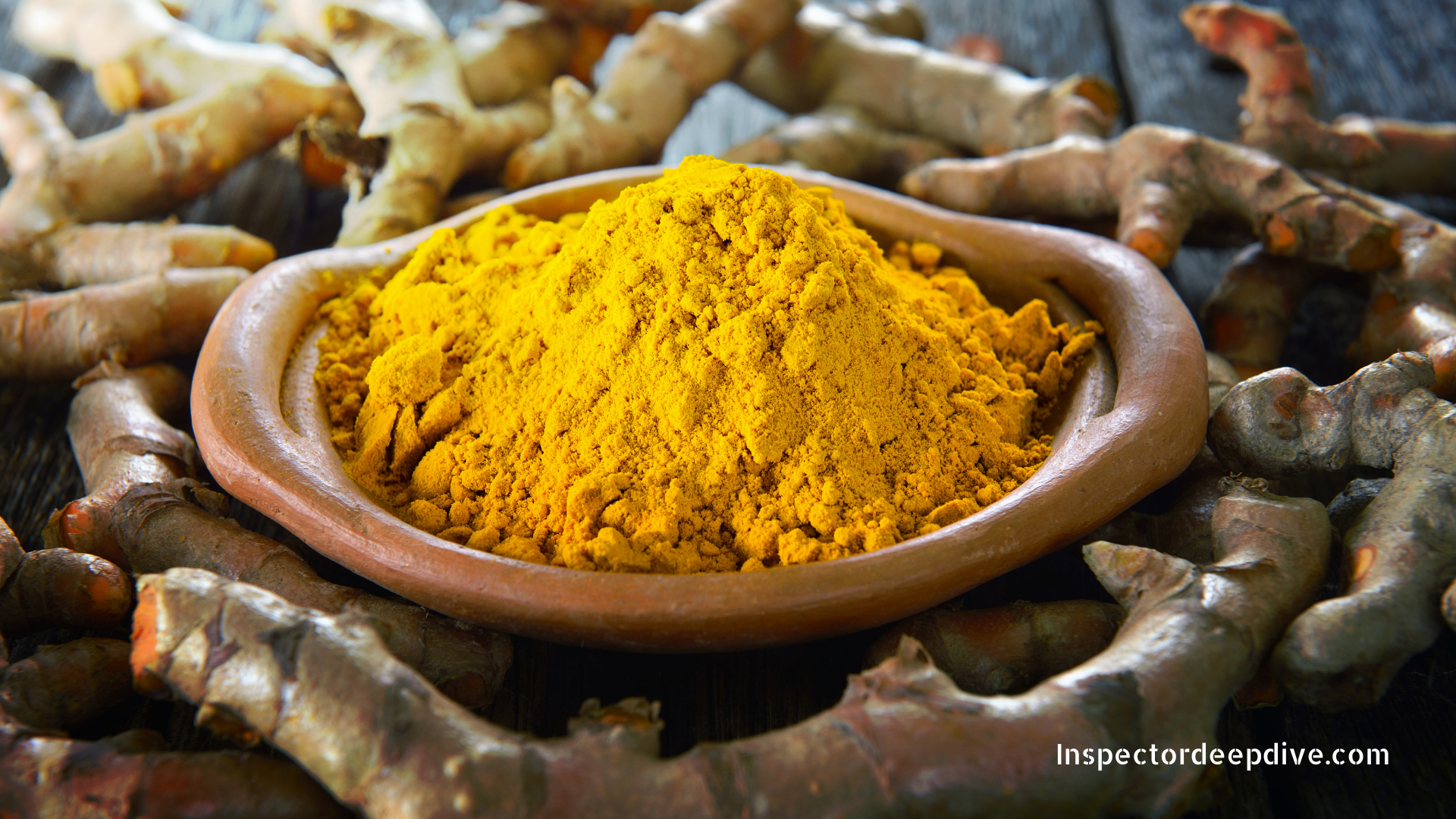Curcumin: Nature’s Best Anti-Inflammatory

Curcumin is the active compound in turmeric, the bright yellow spice used for millennia in traditional medicine. It’s not just a flavor booster curcumin is one of the most-studied natural anti-inflammatory and antioxidant compounds available.
Why it Matters
Chronic inflammation is a root driver of many long-term conditions heart disease, some cancers, diabetes, and neurodegenerative disorders like Alzheimer’s. Curcumin helps reduce inflammation by targeting key pathways (for example, NF‑kB, a master regulator of inflammatory responses) and by increasing the activity of the body’s own antioxidant enzymes. In short: it helps quiet damaging inflammation and protect cells from oxidative stress.
Brain & Mood Support
Curcumin raises levels of BDNF (Brain‑Derived Neurotrophic Factor), a growth factor important for neuron survival, plasticity, and learning. Low BDNF is linked to depression and cognitive decline; some trials suggest curcumin can improve mood and cognitive measures with fewer side effects than many pharmaceuticals.
Heart, Joints & Aging
Heart: Improves endothelial (blood vessel) function and may lower clotting risk.
Joints: Reduces pain and stiffness for many people — sometimes matching NSAIDs without the gastric side effects.
Aging: Modulates biological pathways tied to aging and cellular health, supporting healthier longevity.
The Catch: Absorption
Curcumin on its own is poorly absorbed and is rapidly cleared. Practical ways to boost uptake:
Combine with black pepper (piperine) dramatically increases bioavailability.
Take with fat (curcumin is fat‑soluble) e.g., in a meal with healthy oils.
Choose higher‑bioavailability formulations: curcumin phytosome, liposomal curcumin, or other enhanced-release forms.
Practical Use
Food: Add turmeric to soups, stews, rice, or enjoy “golden milk.”
Supplements (common guidance): 500–1,000 mg curcumin (standardized) with piperine, once or twice daily.
Consistency: Benefits build over weeks to months it’s a long‑game supplement, not an overnight fix.
Realistic Expectations
Curcumin isn’t a miracle cure and won’t undo years of unhealthy habits. But as part of a healthy lifestyle (balanced diet, movement, sleep), it’s a powerful, well-researched ally for reducing inflammation and protecting long-term health.
Safety & Cautions
Not for everyone check with a healthcare professional before starting curcumin if you:
Take blood thinners or antiplatelet drugs,
Have gallbladder disease or bile duct obstruction,
Are pregnant or breastfeeding, or
Have complex medical conditions or are on multiple medications.
This is general information, not medical advice.
Simple Curcumin Buying Guide: What You Really Need to Know
Curcumin is awesome, but buying the right supplement can be tricky. Here’s how to pick a good one without getting confused:
1. Read the Label Like a Detective
What's the real amount? Don't just look for "turmeric." You want to see "Curcuminoids" and how many milligrams (mg) there are per serving. That's the good stuff!
Is it "Standardized"? Look for "Standardized to 95% Curcuminoids." This means it's a strong, concentrated extract, not just powdered spice.
Any fancy names? If you see names like "Meriva," "Longvida," or "Theracurmin," that's usually a good sign. These are special versions designed to get more curcumin into your body.
Black Pepper (Piperine)? This is key! Black pepper helps your body absorb curcumin way better. Look for "Piperine" or "BioPerine" on the label, usually around 5 mg.
How many pills for how much? Check the "Serving Size" and how many servings are in the bottle. Make sure it lasts a reasonable time.
Proof it's good? Look for seals like "USP Verified," "NSF," or "ConsumerLab." These mean an independent group checked the product. A "GMP" (Good Manufacturing Practices) statement is also good.
Expiration Date: Always check when it expires!
2. What Do Those "Fancy Names" Mean?
Some curcumin is absorbed better than others. Here are the main types:
Basic Curcumin + Black Pepper: This is the most common and often the most affordable. The black pepper (piperine) helps your body actually use the curcumin.
"Phytosome" or "Liposomal" Curcumin: These are like special delivery systems that wrap the curcumin in tiny packages, making it much easier for your body to absorb. They're often more expensive but can be more effective.
Other Special Types (Longvida, Theracurmin, BCM-95): These are also advanced forms designed for better absorption. If you see these names, it generally means a higher quality product.
Simple Rule: If it has black pepper or one of those special names, it's probably better absorbed than plain curcumin.
3. How Much Should You Take?
General Dose: Many supplements suggest 500-1,000 mg of standardized curcumin extract per day. You might take it once or twice a day.
Special Types: If you have one of those "fancy name" curcumin types (like Meriva or Longvida), you might need a lower dose because your body absorbs it better. Just follow the directions on that specific product's label.
Always with Food: Curcumin likes fat, so always take your supplement with a meal that has some fat in it.
4. Red Flags to AVOID!
"Proprietary Blend" without amounts: If the label doesn't tell you exactly how much curcumin is in it, skip it. They're hiding something.
Only "Turmeric Root Powder": This is just ground spice, not a concentrated extract. It won't give you much curcumin.
Crazy Promises: If it claims to "cure cancer" or "fix everything," it's probably fake. Supplements support health; they don't cure diseases.
No Proof: If they don't show any third-party testing or quality seals, be wary.
Super Cheap, Big Claims: If it seems too good to be true for the price, it probably is.
Safety, interactions & precautions
Interactions: curcumin can increase bleeding risk and may interact with anticoagulants/antiplatelets (warfarin, aspirin, clopidogrel), some chemotherapy agents, and drugs metabolized by certain liver enzymes.
If you have gallbladder disease, active bile duct obstruction, are pregnant or breastfeeding, or have complex medical conditions check with your clinician before using.
High doses can cause GI upset or mild nausea in some people.
Stop curcumin before surgery if advised by your clinician (bleeding risk).
Keep an eye out for added ingredients that may affect you (stimulants, extra vitamins, unnecessary sweeteners).
Red flags avoid these
“Proprietary blend” that hides exact curcumin/curcuminoid amounts.
Vague labeling only listing “turmeric root” with no extract or curcuminoid percentage (turmeric root powder contains very little curcumin).
Overblown claims: “cures cancer,” “guaranteed to fix Alzheimer’s,” or other medical cure promises. Legitimate supplements will not claim to cure disease.
No third‑party testing, no COA available on the website, or manufacturer refuses to provide lab testing on request.
Excessive filler/undesirable excipients (unnecessary artificial colors, high doses of magnesium stearate if you prefer to avoid it, questionable preservatives).
Very cheap products with large claims and no transparency.
Quality markers to prefer
Manufacturer provides a COA or third‑party test result for purity/potency.
USP/NSF/ConsumerLab or other reputable verification.
Transparent company with contact info, manufacturing location, and GMP compliance.
Minimal, clear inactive ingredients and allergen labeling (soy, gluten, dairy, nuts).
Quick shopping checklist (one‑line checks)
Curcuminoids listed (mg/serving)
Standardized % or branded formulation (Meriva/BCM‑95/Longvida/Theracurmin/ liposomal)
Piperine/BioPerine present? (mg)
Third‑party test/COA available?
Clear serving size & daily dose?
No proprietary blend hiding amounts?
Expiry date & GMP?
Curcumin: Nature’s Firefighter for Your Body
info@inspectordeepdive.com
© 2025 food.InspectorDeepDive.com. All rights reserved. Content may not be copied or republished without permission.
This article is for informational purposes only. InspectorDeepDive.com does not provide medical advice. Always consult a licensed healthcare provider before making dietary or health decisions.
